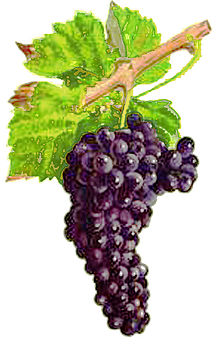| Mondeuse noire | |
|---|---|
| Grape (Vitis) | |
 Mondeuse in Viala & Vermorel | |
| Color of berry skin | Noir |
| Species | Vitis vinifera |
| Also called | see list of synonyms |
| Origin | France |
| Notable regions | Savoy |
| VIVC number | 7921 |
Mondeuse noire (French: [mɔ̃.døz nwaʁ]) is a red French wine grape variety that is grown primarily in the Savoy region of eastern France. The grape can also be found in Argentina, Australia, California, Switzerland and Sicily. Plantings of Mondeuse noire was hit hard during the phylloxera epidemic of the mid to late 19th century which nearly wiped out the vine from eastern France. While the grape recovered slightly in the 20th century, French plantations of Mondeuse noire fell sharply in the 1970s, with just over 200 hectares (490 acres) left in France in 2000. In the early 21st century, it seems the variety has increased somewhat in popularity, as it can give good wines if the planting site is chosen carefully.[1]
It was previously suggested that Mondeuse noire was identical to the northern Italian wine grape variety Refosco dal Peduncolo Rosso due to the similarity of the wines. In California, many plantings of Mondeuse noire were called Refosco, further adding to the confusion. DNA analysis has shown that this is not the case, and that the two varieties are unrelated.[1] Mondeuse noire is very similar to Muscardin which is found in Southern Rhône where it is one of the thirteen grape varieties permitted in the wine Châteauneuf-du-Pape. One difference is that Muscardin has less sensitivity to downy mildew.[2]
Ampelographers also thought that Mondeuse noire was a color mutation of Mondeuse blanche but DNA evidence has shown that not to be the case with the two varieties having a parent-offspring relationship though it is not yet clear which variety is the parent and which is the offspring. References to Mondeuse usually are to Mondeuse noire rather than to Mondeuse blanche. Mondeuse noire does have a pink-berried color mutant, Mondeuse grise, which was on the verge of extinction until ampelographer Pierre Galet was able to identify vines and have cuttings planted at the Domaine de Vassal conservation vineyard in Montpellier run by the Institut National de la Recherche Agronomique (INRA).[3]
In Savoie, Mondeuse noire is used in blending with Gamay, Pinot noir and Poulsard where it contributes its dark color and high acid levels to the wine that allow the wines to age well.[4] The grape is a permitted variety in the Appellation d'origine contrôlée (AOC) wines of Bugey in the Ain department and Vin de Savoie.[3]
- ^ a b Jancis Robinson, ed. (2006). "Mondeuse". Oxford Companion to Wine (Third ed.). Oxford: Oxford University Press. pp. 448. ISBN 0-19-860990-6.
- ^ J. Robinson Vines, Grapes & Wines pg 203 Mitchell Beazley 1986 ISBN 1-85732-999-6
- ^ a b J. Robinson, J. Harding and J. Vouillamoz Wine Grapes - A complete guide to 1,368 vine varieties, including their origins and flavours pgs 649-651, 878 Allen Lane 2012 ISBN 978-1-846-14446-2
- ^ J. Robinson Vines, Grapes & Wines pg 201 Mitchell Beazley 1986 ISBN 1-85732-999-6